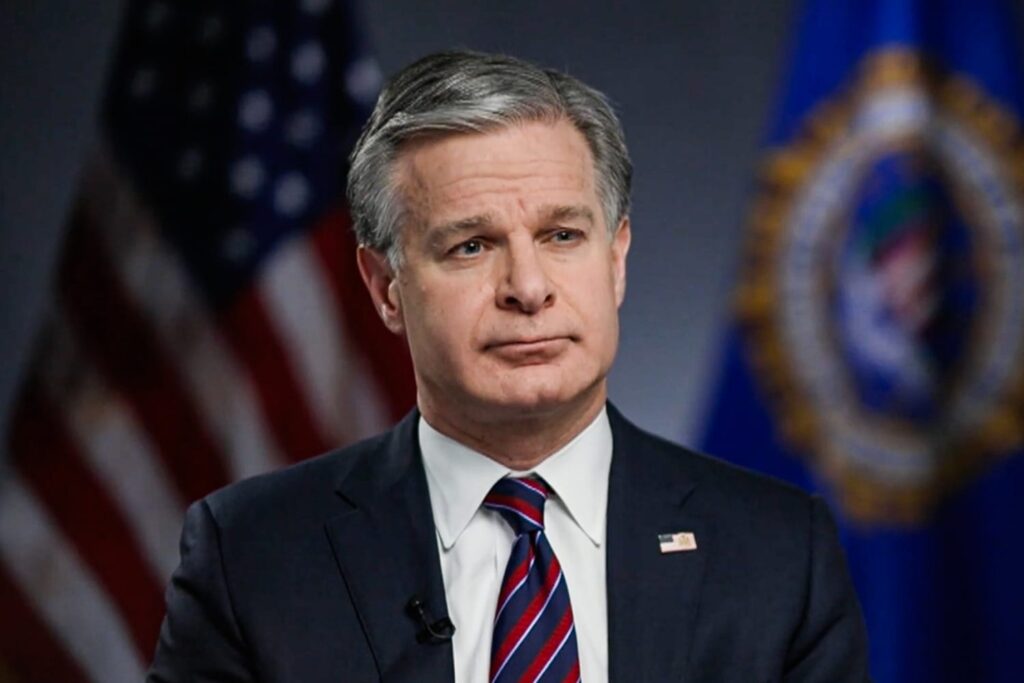As President-elect Donald Trump prepares to return to the White House, FBI Director Christopher Wray is expected to retire.
Although FBI directors are appointed to a 10-year term, Trump’s frequent and harsh criticisms of Wray suggest that he might replace him immediately upon taking office—or that Wray could step down to avoid being dismissed.
Such a change would allow Trump to install new leadership at the FBI, aligning it more closely with his agenda, especially as he signals plans to target political adversaries.

“He enjoys the work, he’s committed to the bureau, he’s an outstanding public servant — but I don’t think he’s going to lobby for the job,” Gregory Brower, a former FBI official who served as director of congressional affairs until 2018, said of Wray.
“If the new president wants to replace him, then that’s what the new president’s going to do,” he added. “Based on what Trump has said in the past, I think it’s likely we’ll see that.”
Trump’s transition office did not respond to a request for comment. An FBI official reported that Director Christopher Wray continues to oversee daily operations at the bureau, including multiple visits this week to the FBI’s election command post, and is actively working with his team to prepare the agency for the coming year.
This official, a senior executive who interacts regularly with Wray, spoke on the condition of anonymity, as they were not authorized to discuss these details publicly.
READ ALSO: Donald Trump Plans To Withdraw US Troops From Northern Syria
Though Trump has not recently commented on Wray, he has long maintained a strong interest in the FBI and Justice Department.
This focus stems in part from the series of investigations that impacted his first term and post-presidency, including two that led to indictments and are now expected to conclude.
These positions are under intense scrutiny, as the occupants may face Trump’s expressed interest in pursuing action against his opponents, despite institutional checks that complicate such efforts.
Additionally, the FBI is now confronting an array of global threats not seen in recent history.
A recent Supreme Court decision granting former presidents broad immunity could further embolden Trump to press for specific Justice Department actions, as occurred during his first term.
Wray, a respected Republican attorney and former senior Justice Department official under President George W. Bush, was nominated by Trump in June 2017 to succeed James Comey, the FBI director originally appointed by President Obama and dismissed by Trump amid an investigation into connections between Trump’s 2016 campaign and Russia.
Wray was recommended to Trump by former New Jersey Governor Chris Christie, whom Wray had represented in a high-profile investigation into the closure of the George Washington Bridge.
“In 2017, the president wanted an FBI director with bipartisan support and a reputation for integrity who would maintain a low public profile and defer to the Attorney General,” Rod Rosenstein, the deputy attorney general at the time of Wray’s appointment, said in an email to AP this week,
It didn’t take long for Wray to provoke Trump’s ire.
In 2018, he parted ways with Trump over the administration’s decision to declassify information regarding the FBI’s surveillance of former campaign aide Carter Page. He later drew Trump’s ire during congressional testimony by emphasizing the threat of election interference from Russia while Trump was focused on China.
He also described antifa—an umbrella term for leftist militants—as an ideology rather than an organization, contradicting Trump’s push to designate it as a terrorist group.
By the 2020 election, Wray’s position was precarious. Trump withheld a vote of confidence before the election, and Donald Trump Jr. publicly accused Wray of “protecting corrupt Democrats.” Still, Trump ultimately kept him in place.
Tensions escalated in 2022 when FBI agents searched Trump’s Florida home for classified documents, leading to multiple indictments.
This past summer, Trump criticized the FBI for not immediately verifying that he had been struck by a bullet during an alleged assassination attempt and called for Wray’s resignation after the director publicly vouched for President Joe Biden’s mental acuity during a congressional hearing.
Throughout these challenges, Wray has consistently urged FBI staff to “keep calm and tackle hard,” steering the bureau through politically charged times marked by criticism from both Trump and congressional Republicans.
These critiques range from the Hunter Biden investigation to government surveillance practices.
Wray has largely tried to defuse conflicts by adhering to standard procedures and addressing congressional demands while remaining committed to correcting past errors.
For instance, he previously implemented numerous corrective actions after surveillance issues surfaced in the Trump-Russia investigation, openly acknowledging the FBI’s missteps in that probe.
“I look not just at the one or two investigations being discussed breathlessly on social media or cable news but at the impact that we’re having across the board to protect the American people,” Wray said in an interview AP with last year.
The typically calm and reserved FBI director has at times taken a strong stance in defending his agency from what he perceives as baseless accusations, dismissing as absurd any suggestion that the bureau was involved in the January 6, 2021, Capitol attack and labeling claims of his anti-conservative bias as “insane.”
READ ALSO: Trump’s Team Reportedly Plans to Release Epstein & Diddy’s Client Lists
Removing Wray before the end of his 10-year term—meant to insulate the FBI from presidential political influence—would be highly unusual.
For example, President Obama not only retained Robert Mueller as director but also extended his tenure by two years, even though Mueller was appointed by President Bush.
President Trump initially kept James Comey as director but dismissed him in May 2017, citing “this Russia thing,” referring to the ongoing Russia investigation.
It’s uncertain who might succeed Wray if he were replaced, but previous candidates considered after Comey’s firing, such as Adam Lee, a former top agent in Richmond, and William Evanina, a former chief of U.S. counterintelligence, could be among those considered again.
Frank Montoya, a former senior FBI official, expressed concern that Trump may seek a successor willing to “kiss the ring” and follow his directives closely.
“This is all about seizing control of the apparatus from the get-go,” he said.
(AP)
Follow the Parallel Facts channel on WhatsApp: https://whatsapp.com/channel/0029VaCQSAoHgZWiDjR3Kn2E









Leave a Reply